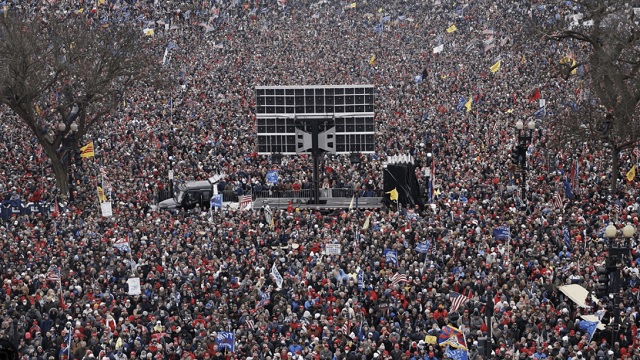Supreme Court Could Upend Hundreds of January 6 Prosecutions — and, Potentially, President Trump’s

We must restore the Constitution and prosecute the Democrat traitors who overthrew this country.
The persecution and prosecution of election fraud protesters was an act of war against the American people and our Constitution. I covered ever Trump rally both before and since the 2020 election, there was never any violence. Counter that with every Democrat, BLM, Antifa riot.
Remember this, they can find grandmas who went to DC to protest election fraud, but they can’t find the pipe bomber or the Biden family member who was snorting cocaine at the White House.
Complete coverage of January 6th political persecution here.
Supreme Court Could Upend Hundreds of January 6 Prosecutions — and, Potentially, President Trump’s
A rioter asks the high court to weigh in on whether a statute intended to fight financial crime is an appropriate tool for prosecutors to use against violent protesters.
By: A.R. Hoffman, NY Sun, July 10, 202306:42:26 am
The filing at the Supreme Court of a petition arguing that hundreds of defendants who engaged in violence at the Capitol were mischarged has the potential to upend the largest prosecutorial effort in the Department of Justice’s history.
The justices have been asked to consider whether a federal law, Section 1512 (c)(2) of the United States Code, is a fit for what transpired at the Capitol. The statute assigns 20 years in prison for anyone who “corruptly alters, destroys, mutilates, or conceals a record, document,” or “otherwise obstructs, influences, or impedes any official proceeding, or attempts to do so.”
This issue was flagged in January by The New York Sun, which wondered if “obstruction of an official government proceeding” is “appropriate for the former president’s behavior that day,” and noted that the statute is “one of the government’s primary tools in its sprawling portfolio of prosecutions.”
The Sun predicted in an April editorial, “The Sarbanes-Oxley Riot,” that the law’s unsettled application “opens the door to further litigation — and possible intervention by the Nine.” The riot, we ventured, “offers no justification for traversing the Constitution by way of overambitious interpretation of criminal laws by prosecutors.”
The charge has been deployed against some of January 6’s highest profile participants, including the “QAnon Shaman,” Jacob Chansley; the leader of the Oath Keepers, Elmer Stewart Rhodes III; and an Olympic swimmer, Klete Keller. The DOJ’s reliance on its provisions has also faced some skepticism from lower court judges, who see its application as a stretch.
The statute also looms over President Trump. It was included in the January 6 committee’s criminal referrals to the DOJ, suggestions that now belong in the purview of Special Counsel Jack Smith. Its popularity among prosecutors thus far is likely in part due to its stiff maximum sentence of 20 years behind bars. That’s more than is advised for such a serious crime as seditious conspiracy.
The law’s origins stretch back not to ages of war and revolution, like the laws banning seditious conspiracy and insurrection, but rather to efforts to crack down on white collar crime, codified in the Sarbanes-Oxley Act of 2002, which increased regulation in the wake of the implosions of Enron and WorldCom.
This petition to the Supreme Court emerges from the case of Edward Lang, who hails from the Hudson Valley and now sits behind bars awaiting sentencing for, among other things, assaulting a police officer with a baseball bat. In a video posted to Twitter after January 6, 2021, he asserted that “dying for our rights is the only option that any person with a logical brain sees right now. This is it.”
Mr. Lang was indicted on 11 charges, and pleaded not guilty to all of them. He has not yet stood trial. A district court judge, Carl Nichols, though, tossed the charge relating to obstruction of an official proceeding in respect of Mr. Lang and two others accused of violence at the Capitol. He reasoned that their cases had nothing to do with doctoring documents or records.
The panel of the United States appeals court for the Fourth Circuit, though, by a 2-to-1 margin, upheld the use of the obstruction charge, deciding that Judge Nichols’s reading was too cramped. Judge Pan, writing for the majority, ruled that the “broad interpretation of the statute — encompassing all forms of obstructive acts — is unambiguous and natural.”
The request for a hearing before the Nine asks whether the statute, intended to clamp down on financial malfeasance, “can be used to prosecute acts of violence against police officers in the context of a public demonstration that turned into a riot.” Mr. Lang argues that a “statute intended to combat financial fraud has been transformed into a blatant political instrument to crush dissent.”
The petition tells a story of prosecutorial overreach, warning that a “revolution is underway, with ambitious federal prosecutors reworking the penal code to make it do work never intended to be done, work that threatens to chill, and does chill, ordinary Americans in their First Amendment.
AUTHOR
Pamela Geller
RELATED TWEET:
In case you missed it a couple months back— The Censored video re-emerges of Pantifa in black clad disrobing and changing into MAGA gear on Jan 6.. 🤨
Won’t see THIS on MSM .. 🧐 pic.twitter.com/FknWwjq7qC
— 🔥🇺🇸 KC 🇺🇸🔥 (@KCPayTreeIt) July 9, 2023
EDITORS NOTE: This Geller Report is republished with permission. ©All rights reserved.


Leave a Reply
Want to join the discussion?Feel free to contribute!